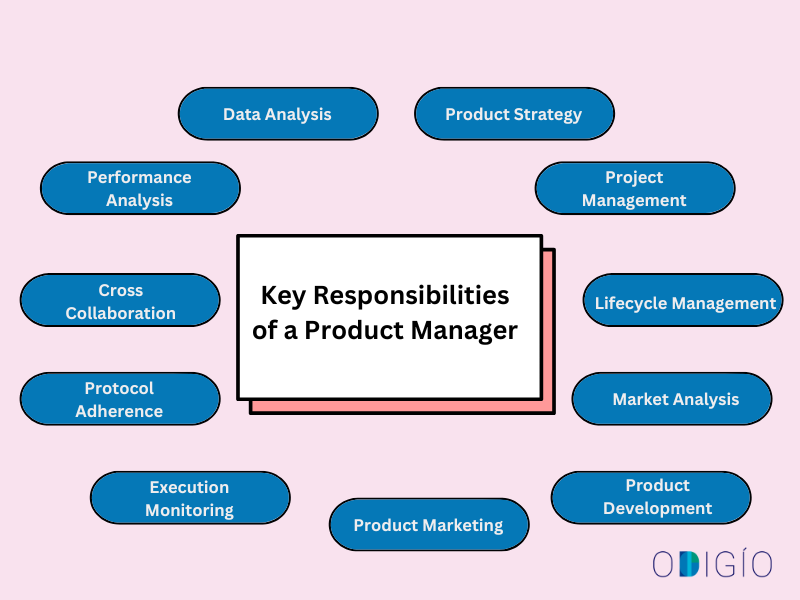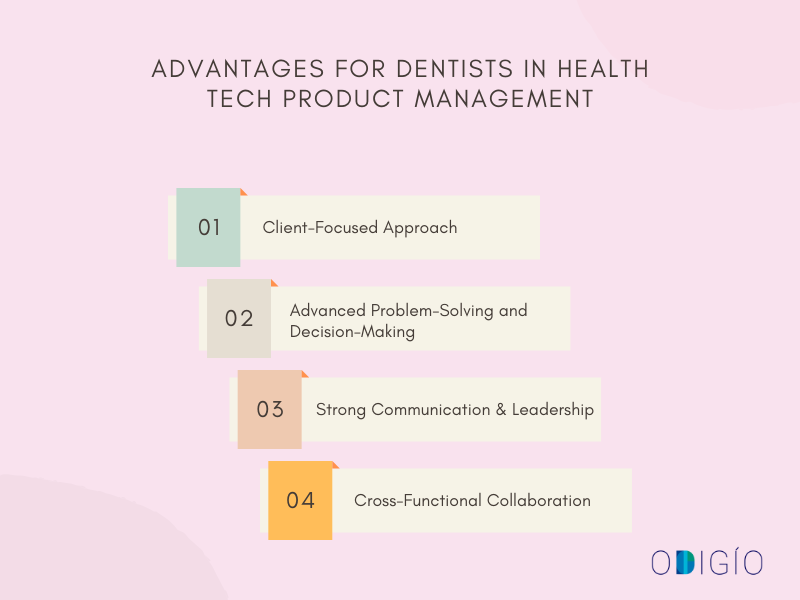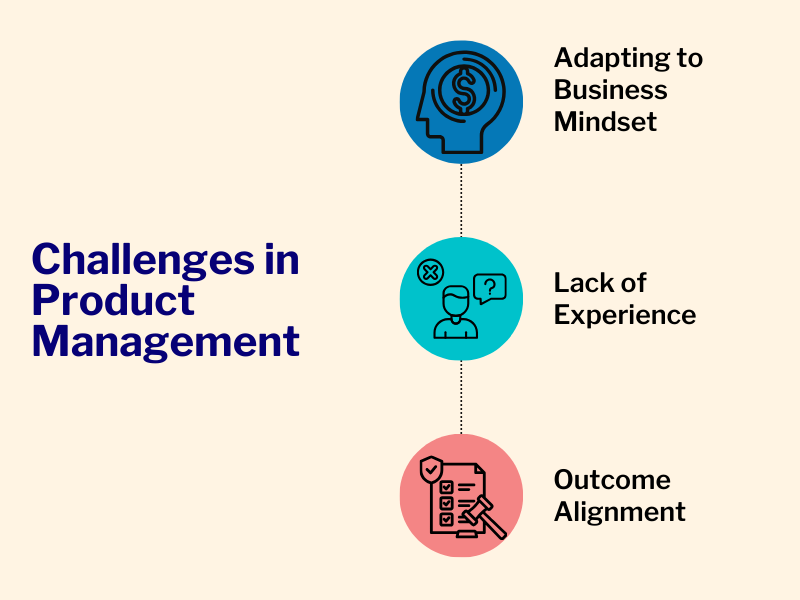Product Management After Dentistry: A Comprehensive Guide
Written by: Dr Vaishnavi Naik, Reviewed by: Dr Kinjal Rawal
You think tech roles are only for engineers? Think again. With your clinical training and strategic thinking acumen, product management can be a powerful next step for you.
Explore everything about product management after BDS & map out the steps to transition into this role.
What is Product Management in Healthcare?
Product management in healthcare is the process of conceptualising, innovating, planning, developing, marketing, and launching products. (1)
The aim is to enhance patient experience and operational efficiency while ensuring compliance with relevant requirements. (2)
The key responsibilities of a product manager include:
- Data analysis
- Product strategy
- Project management
- Product lifecycle management
- Conducting product market analysis
- Coordinating product development
- Leading product marketing
- Monitoring product execution
- Adherence to organisational standards
- Cross-functional collaboration
- Conducting product performance analysis
Source: expertia.ai (3)

Before we explore the career path, it’s important to understand why product management is gaining momentum in healthcare.
Why Product Management in Healthcare?
Healthcare companies are rapidly digitising and becoming healthtech companies, so companies need experts who can bridge the gap between medicine and technology. (4)
Product management in healthcare is a dynamic field for professionals seeking to develop user-focused solutions that enhance clinical workflows and improve efficiency.
There is a demand for PMs across hospitals, startups, MNCs, and pharmaceutical companies to ensure products are safe, effective, and aligned with the organisation’s needs.
Health Tech Market Size
The healthtech industry in India is expected to reach approximately $78.4 billion by 2033 (5), creating significant opportunities for professionals who can blend medical expertise with product innovation.
This provides a wide range of opportunities and career growth for product managers in this industry.
If you’re also exploring strategy-focused non-clinical roles, you may find healthcare consulting a useful comparison, especially for understanding how clinical knowledge guides business decisions.
Start Your Product Management Journey
Let’s get you started
Why Transition from Dentistry to Product Management?
Many dentists today are exploring roles beyond clinics, driven by a desire for flexibility, impact, and innovation.
Product management is one such role that bridges medical knowledge and technology to create real-world solutions.
Apart from this, the dental curriculum equips you with transferable skills such as:
- User empathy
- Data analysis
- Problem-solving
- Cross-functional collaboration
If you want to work in healthtech, this can be a good option to consider, as it allows you to bridge your clinical knowledge with technology.
Watch the podcast to understand the basics of product management.
Advantages for Dentists in HealthTech Product Management
Being a dentist and having clinical expertise gives you an edge in this field of product management and development, like:
- Client-Focused Approach:
- Dentists interact with patients daily, giving them a strong understanding of user needs.
- This skill enables them to create products that enhance user experience, outcomes, and satisfaction.
- Advanced Problem-Solving and Decision-Making:
- Clinical practice trains dentists to analyse situations quickly and accurately.
- These are transferable skills help them tackle complex product issues with clarity.
- Strong Communication and Leadership:
- Explaining diagnoses and treatment plans builds clear and empathetic communication.
- This directly supports leading meetings, aligning teams, and driving product decisions.
- Cross-Functional Collaboration:
- Dentists already work with labs, assistants, specialists, and admin teams.
- This translates smoothly into working with engineers, design, and the marketing department in product management.

Here are the key skills you’ll need to thrive in healthcare product management.
Skills Required for Product Management in Healthcare
Healthcare product managers need a blend of core product management skills and specialised healthcare knowledge, including:
- Conduct market research
- Understand market gaps, analyse trends, and use data to guide product decisions.
- Interpret clinical and industry data
- Strong analytical skills enable you to determine what to build and how to enhance existing solutions.
- Risk management
- Product management also involves identifying risks early, analysing complications, and preparing strong alternatives.
- Carry out product research
- This involves evaluating needs, economic viability, and feasibility.
- Focus on user experience
- Making the product intuitive, whether digital or physical, is a core requirement.
- Product development roadmap
- Familiarity with tools like Jira, Trello, or Asana helps track tasks and updates effectively.
- Methodology knowledge
- Understanding Scrum and Kanban enables smoother execution with engineering teams.
- Technical Writing skills
- PMs often document product requirements, features, and workflows clearly and concisely.
- UX/UI designing skills
- Understanding how design principles work enables you to collaborate more effectively with designers.
- Prototyping
- Tools like Figma, Sketch, or Adobe XD help validate early product concepts.
- A/B Testing
- Tools such as Optimizely or Unbounce assist in comparing product versions to understand what users prefer.
- Data analysis and interpretation
- Skills in Excel, SQL, or visualisation tools (e.g., Tableau) help you make informed decisions.
- Coding and Programming
- While you don’t need to code daily, knowing basic programming helps you communicate with developers.
- Understanding cloud platforms
- Knowledge of AWS, Google Cloud, or Azure facilitates more informed discussions around scalability and architecture.
Most of these capabilities are taught once you step into a product role. To build basics, try exploring the free resources.
Source: expertia.ai(6)
- Communication
- Leadership skills
- Strategic thinking
- Cross-functional collaboration
Other roles, such as scientific editing, can be strong stepping stones, especially if you want to strengthen your analytical, writing, and research skills before transitioning into a PM role.
Let’s understand how you can transition into a product management role even without a technical background.
Steps to Transition into Product Management After Dentistry
Follow these steps for a smooth transition.
Next, let’s break down the different career options you can step into after dentistry.
Career Opportunities in Product Management After Dentistry
For dentists seeking a career that combines problem-solving, innovation, and impact, product management offers a doorway to a new world of opportunities.
The following are some of the career opportunities listed below:
Learn More About the Role
Connect with our expert
Along the way, you may encounter a few challenges. Let’s look at how to handle them.
Challenges and How to Overcome Them
Adapting to Business Mindset
- Seek guidance from a mentor to develop the right mindset for product management.
- Learn basic product management terms to communicate better across teams.
- Understand key industry problems to identify the right product solutions.
- Read about core PM processes, roadmaps, data-driven decisions, and stakeholder communication to strengthen your foundation.
Lack of Experience
- Analysing already existing products and identifying ways to improve them.
- Take free certificate courses.
- Product management internships are one effective way to enter the industry.
- Start by identifying product ideas in the dental and healthcare industries, including the target consumer, market fit, and size, as well as other related considerations.
Outcome Alignment
- PMs constantly juggle what users want, what the business needs, and what the tech team can realistically build.
- Use data, user research, and clear prioritisation criteria to ensure product decisions meet user needs while supporting business strategy.

Conclusion
Product management is all about understanding people, solving real-world problems, and collaborating with diverse teams to create something valuable.
If you come from healthcare, your experience already gives you a strong foundation; you understand patients, real-world challenges, and how to make thoughtful decisions.
You don’t need to know everything on day one; you need curiosity and the willingness to learn.
With your knowledge and a bit of product thinking, you can build meaningful solutions and thrive in this field.
Book a Call Today!
Get personalised guidance
FAQs
Refrences
- Productschool: Healthcare Product Management: The Long-awaited Cure?
- Expertia.ai: Product Manager – Healthcare IT Job Description Template
- Statista: Market size of health-tech sector in India from 2011 to 2022, with estimate for 2025
- CDSO: MEDICAL DEVICES RULES, 2017
- Custommarketinsights: India Healthtech Market Size Likely to Surpass at a CAGR of 28.67% By 2033
